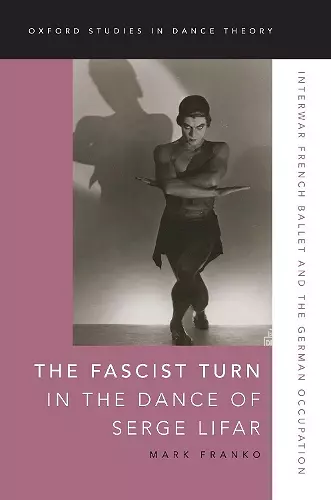The Fascist Turn in the Dance of Serge Lifar
Interwar French Ballet and the German Occupation
Format:Paperback
Publisher:Oxford University Press Inc
Published:25th Aug '20
Currently unavailable, and unfortunately no date known when it will be back

Ukrainian dancer and choreographer Serge Lifar (1905-86) is recognized both as the modernizer of French ballet in the twentieth century and as the keeper of the flame of the classical tradition upon which the glory of French ballet was founded. Having migrated to France from Russia in 1923 to join Diaghilev's Ballets Russes, Lifar was appointed star dancer and ballet director at the Paris Opéra in 1930. Despite being rather unpopular with the French press at the start of his appointment, Lifar came to dominate the Parisian dance scene-through his publications as well as his dancing and choreography-until the end of the Second World War, reaching the height of his fame under the German occupation of Paris (1940-44). Rumors of his collaborationism having remained inconclusive throughout the postwar era, Lifar retired in 1958. This book not only reassesses Lifar's career, both aesthetically and politically, but also provides a broader reevaluation of the situation of dance-specifically balletic neoclassicism-in the first half of the twentieth century. The Fascist Turn in the Dance of Serge Lifar is the first book not only to discuss the resistance to Lifar in the French press at the start of his much-mythologized career, but also the first to present substantial evidence of Lifar's collaborationism and relate it to his artistic profile during the preceding decade. In examining the political significance of the critical discussion of Lifar's body and technique, author Mark Franko provides the ground upon which to understand the narcissistic and heroic images of Lifar in the 1930s as prefiguring the role he would play in the occupation. Through extensive archival research into unpublished documents of the era, police reports, the transcript of his postwar trial and rarely cited newspaper columns Lifar wrote, Franko reconstructs the dancer's political activities, political convictions, and political ambitions during the Occupation.
The tremendous influence that intellectuals have had on the dance that was made during their time and how this dance has been handed down to us is something that needs to be analysed more in the field of dance studies. Mark Franko has provided a great example on how to accomplish this. * Ana Abad Carlés, Pygmalion *
A stupendously well-researched and methodologically daring and innovative book. By looking at the wider picture of a torn society as was France in the period between World War I and World War II, Mark Franko analyses the discursive, the critical, and the aesthetic dimensions of a development that has often been overlooked: the ways in which totalitarian and fascist tendencies, beliefs, and policies were at work not only in dance well before the collapse of the French Republic in 1940. * Franz Anton Cramer, Dance Research *
This is an exceptionally rigorous work presenting multitude of arguments, sources and methodologies, which present some much-needed conclusions for open historiographical answers yet open new questions. * Dana Mills Dance Research Journal *
Serge Lifar, star dancer and director of the Paris Opera, notoriously thrived under the German occupation of France during 1940-1944. Mark Franko examines this matter authoritatively and evaluates Lifar'scontribution to the evolution of ballet in modern France. * Robert O. Paxton, Columbia University *
Franko's new book is both provocative and brilliantly researched, offering a re-thinking of Lifar's life and work while re-shaping received perceptions of French modernism and conventional accounts of what constitutes 'neoclassicism' in dance. The book is ambitious and ground-breaking and situates dance theory and dance history in direct relation to the exigencies of political power. * Susan Jones, University of Oxford *
ISBN: 9780197503331
Dimensions: 152mm x 231mm x 18mm
Weight: 431g
296 pages